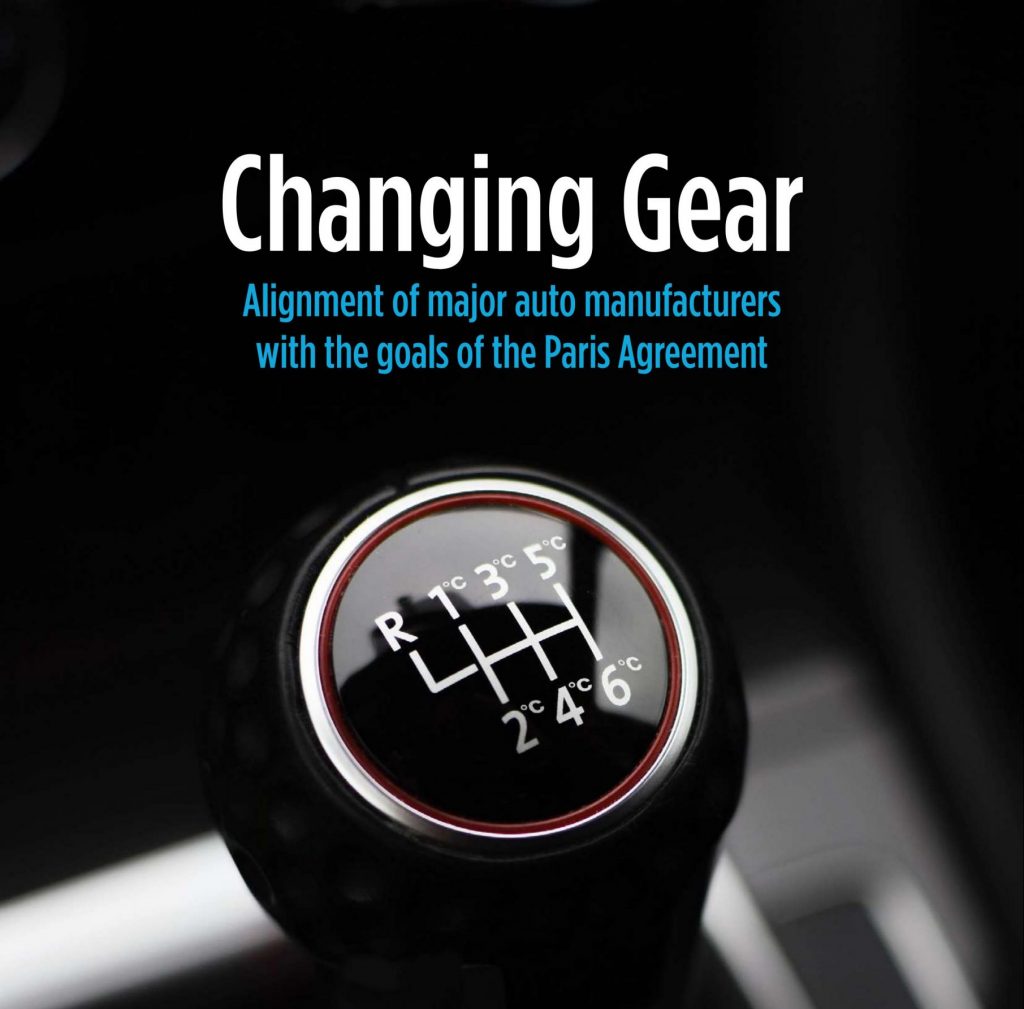Key takeaways:
- Auto company production plans require fundamental change to meet Paris Agreement goals and avoid emitting 1.5 billion tonnes of CO2
- 43 million more internal combustion engine vehicles set to be produced than needed
No single production plan of 14 leading auto companies is fully aligned with the goals of the Paris Agreement, according to analysis from 2° Investing Initiative (2DII), published in a joint report with Institutional Investors Group on Climate Change (IIGCC).
The report, Changing Gear: Alignment of major auto manufacturers with the goals of the Paris Agreement, assesses the production plans for the 14 biggest global car companies by emissions – covering electric (EV), hybrid and internal combustion engine vehicles. Its findings, based on modelling of vehicle emissions and climate scenarios from the International Energy Agency (IEA), show none are aligned with climate scenarios consistent with limiting warming to below 2°C, let alone well-below 2°C, as goals of the Paris Agreement.
Daimler and Geely are the only two manufacturers ensuring at least a portion of their overall vehicle production plans (in this instance for EVs), are partially aligned with a scenario in which the increase in average global temperature is ‘significantly below 2°C’ (B2DS scenario). Three others – Ford, Peugeot and Volkswagen – meet a ‘below 2°C’ scenario (2DS scenario), for EVs and Geely for internal combustion engines.
If all of the auto manufacturers assessed were to align their production plans through to 2024 with a B2DS scenario, then the companies would produce 43 million fewer internal combustion engine vehicles and would emit 1.5 billion fewer tonnes of CO2 over their lifetime. Equivalent to the combined annual CO2 emissions of Canada and Mexico, this reflects both the scale of the opportunity and the impact of the sector on the climate.
The analysis also demonstrates that, for the five-year timeframe assessed (2019–2024), manufacturers are on course to underproduce both electric (by 8.7 million) and hybrid (by 20 million) vehicles.
Publication of the report comes as first-mover companies, such as Volkswagen and Daimler, are making commitments to achieve net zero emissions. The aspiration is welcome, and all firms across the sector will ultimately need to work to net zero business strategies. However, the report findings highlight that production planning still requires significant change in coming years.
Findings from the report will be used to help inform investor engagement with companies across the sector. This includes an emphasis on ensuring that net zero business strategies are not only being put in place, but that commitments are also tied to short- and medium-term production planning targets across all vehicle types.
Simon Messenger, Director, 2° Investing Initiative, said: “The automotive industry holds a critical role in mitigating society’s impact on the climate: without a doubt, all major global manufacturers are currently failing to address the challenge with the level of urgency required. The results of our PACTA analysis are clear: the world’s automakers can’t wait any longer to fundamentally change the way they do business.”
Stephanie Pfeifer, CEO, IIGCC, said: “From safeguarding workers to stabilising businesses, auto companies have the backing of investors in managing the impacts of Covid-19. Yet as production lines restart, it is vital the sector ensures it also responds to the climate crisis and accelerates the shift to cleaner vehicle production. Investors are looking to companies to make the changes required to secure their future in a more sustainable world.”
###
Notes on the analysis
This report’s analysis, conducted by the 2° Investing Initiative team, includes data covering 14 of the largest international automotive manufacturers: BMW, Daimler, Fiat Chrysler, Ford, General Motors, Honda, Nissan, Peugeot, Renault, Saic Motor Corp, Suzuki, Toyota, Volkswagen and Geely. Combined, the companies are estimated to have produced 61.5 million vehicles in 2019 across 53 countries; this is forecasted to increase to 64.5 million in 2024.
The companies’ forecasted production capacity is compared to technological pathways developed by the IEA. Alignment comparisons are made to three scenarios which represent varying levels of global warming by 2100, in comparison to pre-industrial levels:
- Significantly below 2°C: “Beyond 2°C Scenario” (B2DS) (<1.75°C)
- Below 2°C: Between a B2DS and a “2°C Scenario” (2DS) (1.75-2°C)
- Above 2°C: Between a 2DS and a “Reference Technology Scenario” (RTS) (>2°C)
- Significantly above 2°C: Significantly above RTS (>3°C)
Notes on the 2° Investing Initiative’s PACTA methodology
PACTA was developed to address a gap in the analyses conducted by investors, who historically based their assessment of climate-related risk and impact on backward-looking carbon footprints, which has over recent years been accepted as an incomplete means to assess portfolios.
The PACTA methodology consolidates and aggregates global forward-looking asset-level data (i.e. what are the production plans of a specific manufacturing plant over the coming five years) based on third-party business intelligence providers up to the level of an ultimate parent company: for investors, the approach allows them to assess the overall alignment of their portfolios with climate scenarios and the Paris Agreement.
In 2019, as part of technical support provided to the Climate Action 100+ coalition, 2° Investing Initiative developed company-level assessments, allowing financial institutions and other investors to assess the alignment of individual companies within their portfolio with climate scenarios, which provides the basis for this report.
This report has received funding from Bloomberg Philanthropies and from the European Union’s Life NGO program under Grant No LIFE18/NGO/SGA/FR/200020. The report reflects only the authors’ views and the funders are not responsible for any use that may be made of the information it contains.




